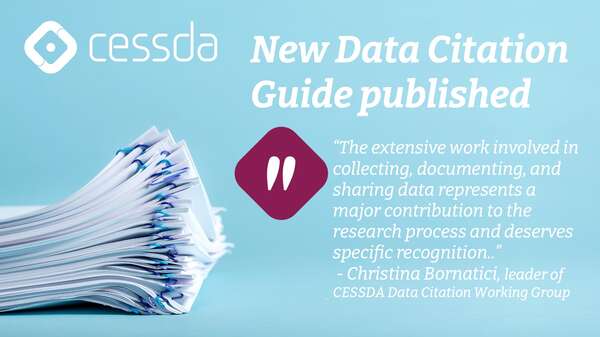
New CESSDA Data Citation Guide published
Research data are valuable scientific outputs that deserve proper recognition. Citing data as independent research products ensures transparency, fosters open science, and aligns with good scholarly practices. To support this, CESSDA has published a new guide for data citations.
This guide outlines the core components of a data citation and provides practical recommendations tailored to key stakeholders, including:
-
Data repositories – Ensuring accessibility and proper citation formats
-
Authors – Applying citations of data sources in publications
-
Academic journals and publishers – Promoting data citation as part of publishing standards.
-
Research Performing Organisations (RPOs) – Supporting institutional policies on data citation
-
Policy, strategy, and funding entities – Integrating data citation into research frameworks
-
Ethics committees – Reinforcing ethical considerations for data use and attribution
The new Data Citation Guide was created by the CESSDA Data Citation Work Group, led by Christina Bornatici, Project manager at FORS, CESSDA’s Swiss Service Provider. Christina hopes the new guide can ensure all the work that goes into scientific research is acknowledged, and that it can improve data citation practices in the scientific community:
"The production of research data is a significant scientific output in its own right. The extensive work involved in collecting, documenting, and sharing data represents a major contribution to the research process and deserves specific recognition. Proper data citation ensures that this effort is acknowledged and valued within the research community. Providing a full and direct citation to data is also essential to ensure transparency. However, in practice, this is not yet consistently achieved. Researchers often mention data in their work but tend to cite associated publications rather than the datasets themselves. This new guide not only builds on previous initiatives by defining the core elements of data citation and explaining how to cite data appropriately; it also addresses key stakeholders, such as researchers, data repositories, academic publishers, and policymakers. It offers specific and practical recommendations for each group, aimed at facilitating and strengthening proper data citation practices."
By adopting these recommendations, the research community can enhance the visibility and credibility of data as a core component of scientific work. Data citation contributes to knowledge sharing, ensures proper acknowledgement for data authors, and strengthens research integrity.